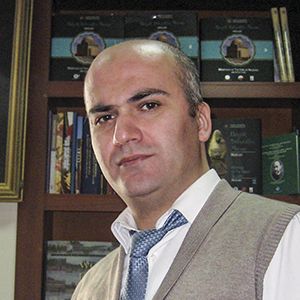Search

Publications
On political forces distribution in Turkey one year before the parliamentary and presidential elections
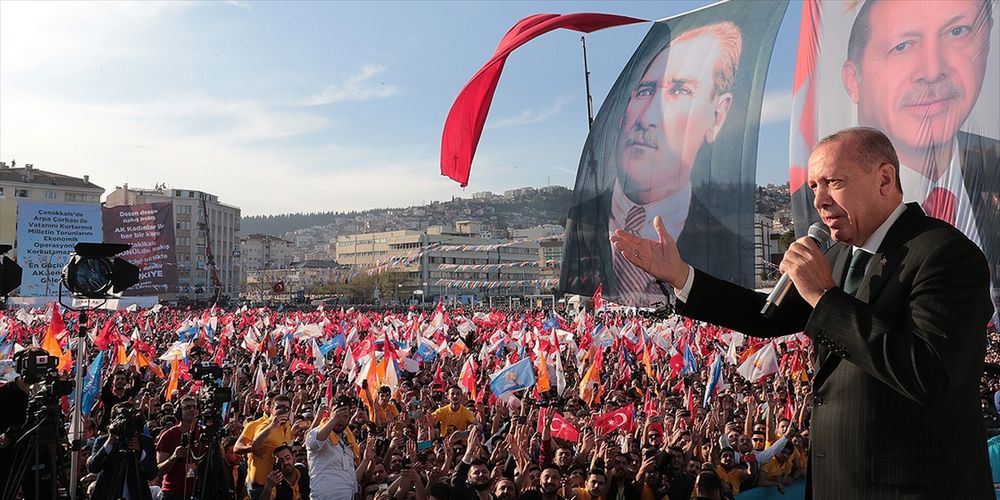
In June 2023 Turkey will face regular parliamentary and presidential elections. The preceding elections having ushered a new page in the country’s political history took place on 24 June 2018. Being the first elections after the constitutional referendum about expansion of presidential power in April 2017, the 2018 elections formally were the last stage on the way to establishing the Presidential Republic. The Turkish people had the possibility to assess the pros and cons of this new form of governance during the recent four years.
According to the survey of the current electoral trends performed by the Center of social and political field studies in twenty Turkish provinces early in 2022, when naming the key problem for Turkey, 65.6% of respondents wrote «economic crisis and unemployment», 12.5% – «lack of democracy», 9.9% – «presidential government system», 5.6% – «the current situation with the legal system», 5.3% – «the Kurdish issue». When responding to the clarifying question, whether they believed the presidential form of government to be a success, 60% of respondents gave a negative answer, 24.3% – a positive answer, and 15.7% were undecided.
When the respondents were asked if they believed that the economic policy of the government formed by the Justice and Development Party would steer the country out of the economic crisis, 25.9% of the respondents said they believed in that, 54.1% expressed the opinion that the current government would not succeed, and 20% were undecided. 56% responded positively to the question about the need for extraordinary elections, 24.2% expressed the opposite point of view. Such survey results, firstly, provided evidence of a certain erosion of the current government’s popularity, and second, gave the opposition the grounds to claim extraordinary elections.
Distribution of political forces
One year before the national parliamentary elections, the key political rivals were two coalitions: the People’s Alliance and the National Bloc.
The following parties joined the People’s Alliance: the Justice and Development Party (JDP), the Nationalist Movement Party (NMP), and the Great Unity Party (GUP).The following parties became members of the National Bloc: the Republican People’s Party (RPP), the Good Party, the Future Party, the Democracy and Progress Party, the Democratic Party, the Felicity Party. It should be noted that the Republican People’s Party and the Good Party make up the main nucleus of the National Bloc. According to journalists, the remaining participants are the minorities, which create the impression of the mass-scale opposition to the current government in Turkey, but are not really capable of serious additions of votes to the opposition alliance.
As of today, the distribution of political forces within the Turkish parliament looks as follows:
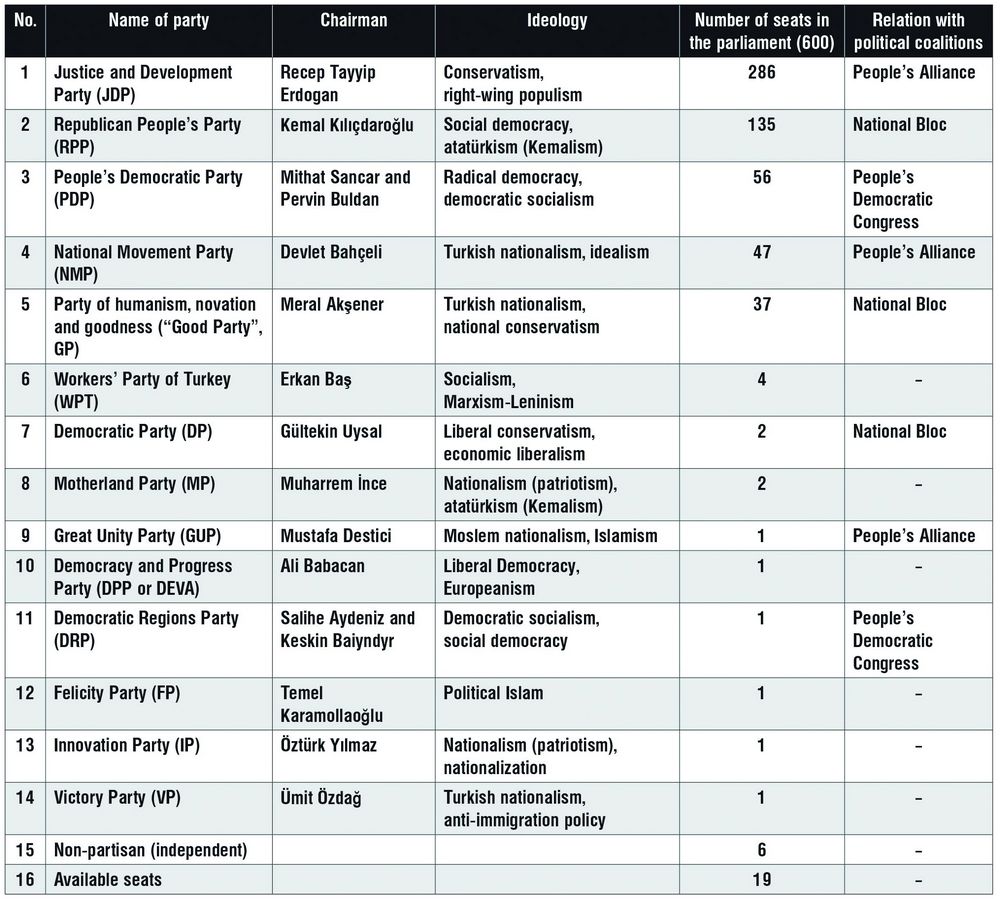
During the recent month the results of several surveys were simultaneously published in Turkey and immediately became the key topic of the political agenda. Yöneylem Araştırma was one of the last companies to publish the results of the citizens’ political preferences survey. This survey was held on 2-4 June 2022, there were 2,700 respondents from 27 provinces, and the question was: «If the elections were to take place this Sunday, who would you vote for?». The results are shown below:
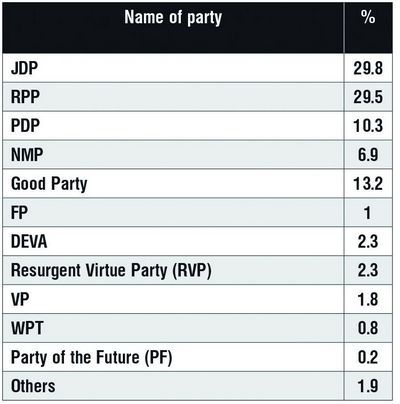
Therefore, the number of People’s Alliance supporters was 36.7%. At the same time, potential voters for the National Bloc was 42.7%.
Another surveying company ORC, known due to its successful forecasts of 2018 campaign results, shared the outcomes of their May survey.
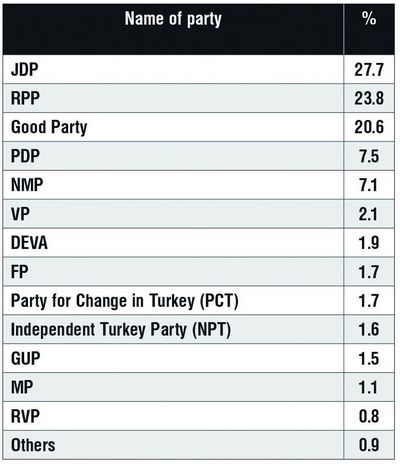
The total number of votes for the People’s Alliance (JDP, NMP and GUP) made 36.3%, and total number of votes for the National Bloc (RPP and Good Party) hit 44.4%.
It means that at present the ruling coalition is behind the opposition. At the same time, it needs to be remembered that at the moment of surveys the candidate representing the ruling People’s Alliance was not defined yet (only on 4 June 2022 after the JDP Congress it became clear that it will be the incumbent President of Turkey Recep Tayyip Erdogan).
On June 9, Erdogan confirmed his intent to run for presidency in 2023. At the same time, the opposition bloc did not present their candidate for the President of Turkey. Due to that, Erdogan urged the opposition leader Kemal Kılıçdaroğlu to make their choice as soon as possible.
Problems of the day: economic aspect
The main problems Turkey is facing today are mainly associated with economic difficulties. The calls for early elections can be heard specifically due to economic distress in the country underpinned mainly by weakening the national currency (Turkish Lyra) and inflation.
According to the Statistics Institute of Turkey, the Consumer Price Index (CPI) in April 2022 grew by 7.25% and made 69.97% year-on-year. According to independent experts, the inflation has already surpassed 100%. The Central Bank (CB) of Turkey exceeded the inflation forecast for the end of 2022 and achieved 42.8% vs. the forecasted 23.2%. Let us remind here, that in November of the previous year the Turkish lira collapsed by almost three times versus early 2021. The CB policy is believed to be the main reason for that. The common opinion is that the CB of Turkey under the pressing of the central government continues to decrease the refinancing rate, which currently makes 14%. In the opinion of President Erdogan, high interest rates do not allow for decreasing the inflation rate and stop the lyra exchange rate collapse. He criticized the Central Bank many times for their refusal to lower the rates. In its turn, the Central Bank explained that the rate-associated indicator is not the reason for the consumer prices growth and national currency depreciation. Recep Tayyip Erdogan dismissed three heads of the Central Bank during the recent three years.
According to the estimates by the Turkish authorities, it is possible to lower the inflation by increasing the interest rates, but then the production output will go down. Analysts caution, that the growth-focused economic policy of the government implemented in the lead-up to the election is unstable and may result in systemic economic crisis. However, the Turkish government believes that by the end of the current year the annual inflation deceleration will bring it down to 50%, and by the end of 2023 – to 19.9%.
According to the survey performed by Metropoll research agency in May 2022, approximately 6 out of 10 Turkish voters do not believe that Recep Tayyip Erdogan can resolve economic problems of the country. Altogether, 59% of the respondents gave a negative answer to the question «Do you believe that Erdogan can resolve the economic problems?», 39% stated that they believed in the President’s ability to improve the economic situation. It is noteworthy that more than half of the respondents (specifically 53.2%) do not believe that opposition parties are capable of doing that.
Thus, the overall trend of political preferences of Turkish voters observed in early 2022 persists in the middle of this year, too. Currently, the total of 42.1% of respondents approve Erdogan’s activities during his presidency. It should be noted that in the current complicated economic environment this is quite a good score; however, it may not be enough for winning in the forthcoming presidential race. This may be the reason for the Turkish authorities to plan the military action against the Kurds in Northern Syria.
In case of success, this action may result in the ultimate strike over the intent to create «Syrian Kurdistan» and in significant strengthening Erdogan’s position (and the position of his party) before the forthcoming elections. At the same time, the review of Turkish media shows that the public opinion is in the least extent concerned with the new front in Syria – due to ambiguous economic situation in the country. Moreover, the military action is normally viewed in the context of potential new wave of refugees. But nevertheless, Turkish military command is already in the frontier zones, and the National Security Council of Turkey discussed the stages of the forthcoming military action at its last session.
Encouraging outlook
In resolving the task of stabilizing the economic situation, the Turkish authorities lay their hopes on export. In May 2022, export grew by 15.2% versus the similar period of the previous year and accounted for USD 19 bn. The authorities believe that by the end of this year the export will achieve USD 25 bn.
In addition, certain hopes of the government are associated with development of gas fields in the Black Sea. It plans to allocate about USD 10 bn for investment into the fields. According to the government, Ankara will have the possibility to produce approximately 14 bcma of natural gas in Zonguldak province and from Sakarya gas field. Also, it will allow to create additional 1,000 jobs. The Turkish discovery of big natural gas reserves in the Black Sea became known on 21 August 2020. By 2023, gas supplies to domestic market are expected.
Turkish defense industry is demonstrating good results. Light airborne attack vehicle Hurjet is expected «to outperform in its combat characteristics the US fifth generation fighter aircraft F-35». Ismail Demir, the Head of the Defense Industrial Bureau, confirmed that. However, he did not explain, which combat characteristics will be better than those of F-35. The Hurjet unveiling is scheduled for 18 March 2023.
Ambitious plans in national naval forces development also catch the attention of the observers. The most high-potential Turkish projects in military shipbuilding are MILGEM corvettes and Anadolu amphibious assault ship. It is assumed that until 2025 Turkish engineers and shipbuilders will not only significantly enhance their competencies to manufacture different types of surface combatants, but will also be able to develop the unmanned surface vessels with elements of artificial intellect.
Who will be Erdogan’s main competitor?
It is extremely difficult to answer this question. It will be a big challenge for the National Block consisting of six parties with absolutely different political programs to determine the single candidate for the forthcoming presidential race. After Recep Tayyip Erdogan was announced the official candidate from the People’s Alliance, he issued 10 questions to RPP Chairman Kemal Kılıçdaroğlu, and the analysts called these 10 questions «the first arrows fired by Erdogan at the opposition within his presidential campaign of 2023». Erdogan’s intent is quite obvious: to make Kılıçdaroğlu decide to run. At the same time, it is absolutely clear that the current RPP leader is not fit for the role of Erdogan’s main opponent.
The main questions of the Turkish President to Kemal Kılıçdaroğlu pertain to fighting terrorism, NATO, Eastern Mediterranean and the Aegean Sea zones – i.e., national security and foreign policy. These questions are closely connected with three recent steps of the Turkish government:
- Presenting claims against Greece, in particular, due to militarization of the Greek islands in the Aegean Sea with support of the USA;
- Advancement of the Turkish conditions for Sweden and Finland acceding NATO, in particular, removing restrictions against Turkey in the defense industry and joining the common position on fighting terrorism;
- Preparation to the next military operation in Northern Syria against the pro-Kurdish People’s Protection Units.
It seems that these three topics will be the main ones on the Turkish political agenda during the forthcoming presidential race.
It should be noted that these questions may put Kılıçdaroğlu to a dead-end. If he demonstrates that he is more nationalistic than Erdogan in the national security sphere, he will lose the Kurds’ votes. In the opposite case, he will face criticism for not being committed to ethnic issues. In other words, by addressing Kemal Kılıçdaroğlu the Turkish leader effectively appeals to the voters showing that RPP leaders are ready to sacrifice the interests of the nation for the sake of their own electoral interests. Moreover, judging by the words of Erdogan, the opposition appears acting not in the interests of the Turkish nation, but in the interests of external forces.
These developments prove that the forthcoming presidential election campaign will be very arduous and tightly competitive. Different arguments pertaining to foreign policy, national security, economy and domestic policy will be practically inseparable. The difference between «us» and «them» being inherent to politics will show up in various spheres. Different political parties of Turkey will use polarization method in their attempts to strengthen their voters’ base. At the same time, they will be increasing the positive narrative to infuse hope into their potential new supporters, especially the younger generation and the undecided. Hence, we will be witnessing these two phenomena simultaneously. The one who invents the most successful political mix, will get the majority of votes.
Apparently, the RPP leadership will be more active in using the so-called «Gezi spirit» (the protests in one of the Istanbul squares) to strengthen its political base. The People’s Alliance, by all appearance, has placed its main bet on the foreign policy. The opposition fully realizes this. Many parties for a good reason already started criticizing the West rather strongly to demonstrate «true nationalism / patriotism».
To continue the review of potential Erdogan’s worthy adversary, we cannot ignore the discussion around the Mayors of two major Turkish cities – Istanbul and Ankara. Ekrem İmamoğlu and Mansur Yavaş at a certain point of time were favored by the opposition. Do they have the same status now? On 20 February 2022, RPP leader Kemal Kılıçdaroğlu stated that the popular Mayors of Istanbul and Ankara will not be running against Erdogan at 2023 elections. Instead, according to RPP chairman, İmamoğlu and Yavaş will continue to manage two major cities of the country. Even though Ekrem İmamoğlu and Mansur Yavaş (both are RPP members) were leading in the last year surveys by Metropoll with 60.4% and 50.7% respectively. However, in the opinion of Kılıçdaroğlu, these survey results have absolutely no value today. Moreover, he was frank in saying that for him it would be an honor to become a single candidate of the six parties united in the opposition alliance.
This makes the assumption stronger about Kemal Kılıçdaroğlu, 73 years old, will become the single candidate of the six-partisan opposition block in the forthcoming race despite the fact of many surveys showing that he is much less popular than three other possible candidates. In other words, for Erdogan Kılıçdaroğlu is «the most convenient» potential candidate, whom he could easily beat in the race.
Let us analyze the main potential opposition candidate in greater detail. Kemal Kılıçdaroğlu has been the leader of RPP (the oldest political party in the Turkish Republic founded by Mustafa Kemal Atatürk) for 12 years already. Under his leadership, the Atatürk’s party from nationalistic and Kemalist party turned into a more progressive left-wing force. The party leader refused to oppose hijab and attempted to lay bridges with other political movements, including the Islamists and conservative democrats. He was also successful in persuading the nationalistic Good Party and the pro-Kurdish People’s Democracy Party to support one candidate during the Mayor’s election in 2018, when the opposition beat the ruling party JDP in Istanbul and Ankara for the first time in almost two decades.
Kemal Kılıçdaroğlu removed the RPP flags from his personal account in Twitter and kept just the Turkish national flag, which was perceived as a sign of his readiness to run as a candidate for presidency. In addition, he now wears a pin with the Turkish flag on his jacket, casting aside the symbols of his party. In his election agenda Kılıçdaroğlu promises to send back millions of refugees from Syria and to reinstate diplomatic relations with Bashar al-Assad, the President of Syria. Kılıçdaroğlu does not approve Turkey purchasing Russian anti-aircraft weapon systems S-400, he believes this caused the break in the relations between Ankara and Washington. He also confirmed that in case he is elected President he will reshuffle the Central Bank management team and will stop interfering into its policy.
Kılıçdaroğlu’s position on the Kurdish issue is not that unambiguous. Possibly, it may be connected with the argument between the nationalistic and social-democratic wings of RPP. In 2013, Kılıçdaroğlu criticized peace negotiations with Kurdistan Workers’ Party (KWP) as a part of a conspiracy for creation of «the Great Kurdistan», and until recently the party was a consistent supporter of military action against this group and its allies (the Kurds from Syria). However, by 2021, Kemal Kılıçdaroğlu changed his position claiming the unfair imprisonment of the former co-Chairman of the pro-Kurdish PDP Selahattin Demirtaº. In September 2021, he said that PDP was a «lawful organization», and called it a counterparty for «resolving the Kurdish issue» in the country.
Will USA interfere into the presidential race in Turkey?
The open interference of Washington and regular contacts between American diplomats and the leaders of the opposition parties constitute an important feature of the presidential race in Turkey. The day before being elected, the US President Joe Biden stated: «We need to make it clear that we support the opposition leaders, and we have a road map. We should be louder in saying what we think. Erdogan should be deposed by way of election. He was beaten in Istanbul just like his party».
At the Summit for Democracy in December 2021, President Biden put forward the Initiative for Democratic Renewal containing five fundamental principles:
- Independent media support;
- Countering corruption;
- Support of the players, which, in the opinion of the US, carry out democratic reforms;
- Promoting «technology for democracy»;
- Protecting «free and fair elections and political processes».
The US State Department allocated USD 424.4 mln to its Agency for International Development (USAID) for these purposes. Previously, the Turkish Ministry of Internal Affairs launched investigation against the organizations financed by CIA-associated Chrest Foundation (11 Turkish associations and NGOs for the total of over USD 2 mln).
It is noteworthy, that the new USA Ambassador to Turkey Jeffry Flake (delivered his credentials on 26 January 2022) has already met with the representatives of all the main opposition parties. Experts believe that Washington will use the «soft power» to try to achieve the task it failed to achieve in July 2016 – to remove Recep Tayyip Erdogan from power.
In such environment, the anti-American sentiment continues to build-up in the Turkish society. This urges on the opposition to use anti-West rhetoric as well. For example, Kemal Kılıçdaroğlu offered to shut down all the US military bases across the entire country. Overall, Ankara has a series of claims against Washington. They are the requirements for lifting the sanctions associated with purchasing Russian anti-aircraft weapon systems S-400, calls for terminating the support of Kurdish combat units, and many other claims.
Cooperation with Russia as one of the discussion topics during the election campaign
In the context of growing anti-US, anti-NATO and anti-West sentiment is Turkey, promotion of cooperation with Russia in various spheres looks quite beneficial. The position of all the Turkish political parties (both the ones from the ruling alliance and those from the opposition block) on the need to cooperate with Moscow, in general, looks quite similar. Most likely, it is associated with a clear demand on behalf of the Turkish society. There is an understanding that Turkey is the player that depends on Russia to a certain extent, in particular, in such spheres as economy, trade, energy, tourism, etc.
They remember pretty well in Turkey: when the tourist flow from Russia declined drastically in 2015-2016, the entire tourism industry suffered, hundreds of hotels were shut down, Turkish resorts suffered thumping losses. Russian market is very attractive for Turkey, and that explains the fact that recently in the context of Western brands leaving Russia the Turks are active in escalating their presence practically in all the spheres.
Turkey realizes, that the level and opportunities for its presence in a number of regions (including Central Asia, the Caucasus, the Middle East, in the Black Sea area, etc.) depend on the Kremlin’s position to a great extent. Russia and Turkey are active in using international formats for interacting on Syria, Libya and Karabakh.
At present, Turkey is striving for an active role of an intermediary in the context of the Ukrainian crisis. Ankara sees it as an opportunity to strengthen its positions in the global arena. Acting as an initiator and an intermediary for creating a new regional mechanism under the auspices of the United Nations targeted at resolving the global food security issues, Recep Tayyip Erdogan gets an additional opportunity to assert himself as a responsible global player. This new outlook for Turkey appeared exactly as the result of on-going direct contacts with the Russian Federation.
Today, Ankara has become practically the only representative of the «collective West» capable of normal dialogue with both Moscow and Kyiv. Turkey did not join the anti-Russian sanctions campaign and has full credit of Russia. Erdogan uses this privilege to the maximum extent in the course of his communications with the Western countries demanding certain trade-offs from them. Such diplomatic maneuver brough important benefits for Turkey – the ones that its potential competitors in settling the Ukrainian crisis do not have.
The progress in cooperating with the Russian Federation can guarantee President Erdogan success both domestically and internationally. No doubt, both the Turkish authorities and the Turkish opposition take this into account. Hence, cooperation with Russia promises to become an important permanent topic for the discussions within the presidential race in Turkey, which practically has started.


